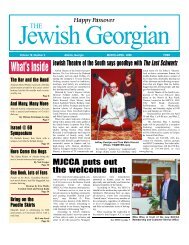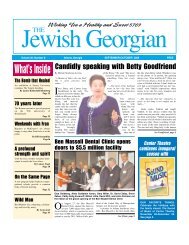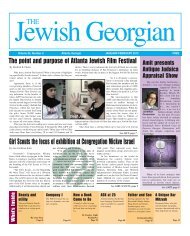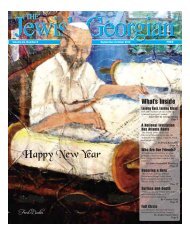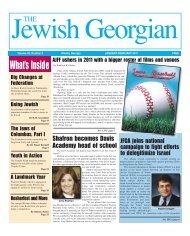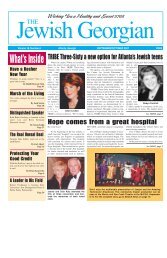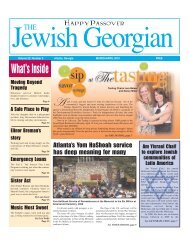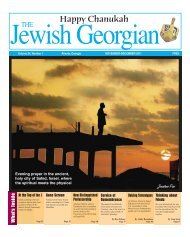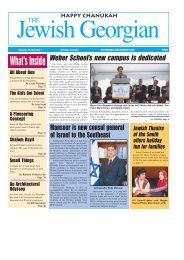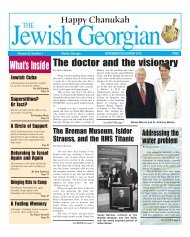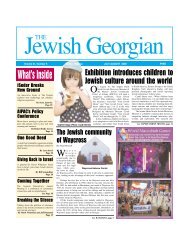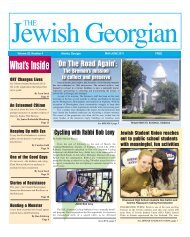FEDERATION NEWS - The Jewish Georgian
FEDERATION NEWS - The Jewish Georgian
FEDERATION NEWS - The Jewish Georgian
Create successful ePaper yourself
Turn your PDF publications into a flip-book with our unique Google optimized e-Paper software.
July-August 2012 THE JEWISH GEORGIAN Page 39<br />
Out to the field: An Atlanta <strong>Jewish</strong> sports story, Part II<br />
By David Geffen<br />
Part I of this story appeared in the May-June<br />
issue of <strong>The</strong> <strong>Jewish</strong> <strong>Georgian</strong>.<br />
My football career continued in a limited<br />
fashion. I acquired a secondhand football and<br />
a helmet, so if I was somewhere and had this<br />
basic equipment with me, a game was possible.<br />
We had a few games at Grant Park, the<br />
public park on Atlanta’s south side. A rowdy<br />
group frequented the park, and those of us who<br />
were not really athletes got banged up. My<br />
parents could not figure out where all my<br />
bruises came from, since I merely told them<br />
that I was just going out to have a good time.<br />
After one season in 1948, my football<br />
burst and there was no interest in reviving it.<br />
What made all these sports more fun were the<br />
games behind the shul, Shearith Israel, on<br />
Washington Street.<br />
<strong>The</strong> synagogue building, the little shul,<br />
was completed in 1930. As part of its previous<br />
structure, Shearith Israel had built a large mikvah.<br />
<strong>The</strong>re, many of the boys and girls, none of<br />
whom is still alive, learned how to swim. My<br />
grandfather, Rabbi Tobias Geffen, was not a<br />
certified lifeguard, but he was the one who<br />
checked the mikvah to make sure it was<br />
“kosher.” No pictures of that mikvah exist, but<br />
I was told that it was enormous, 40’ x 70’.<br />
Women came only after 8:00 p.m., and the<br />
men had free range the rest of the time.<br />
When the new shul was constructed, a<br />
piece of land was left in the back, extending up<br />
to the wooden fence that marked the boundary<br />
of the property. In spite of the rocky terrain, in<br />
spite of rising ground on the sides, and in spite<br />
of the length and width, that land became a<br />
sports paradise. Every day, before religious<br />
school started at 3:30 p.m., the field behind the<br />
shul was packed.<br />
Let me recall a few of the notable athletes.<br />
<strong>The</strong> first were the Tuck brothers: Bobby,<br />
Leon, and Albert. <strong>The</strong>y happened to be<br />
Kohanim, and I assumed that, when they<br />
duchaned on the holidays, their sporting spirit<br />
rose. <strong>The</strong>y blessed us, and God blessed them.<br />
Only Albert was in my age range. He was<br />
a natural athlete who excelled in all sports. His<br />
hands were large, so he could handle a football<br />
and basketball with ease. Albert seemed to<br />
have springs in his legs—jumping was no<br />
problem for him. His two older brothers,<br />
Bobby and Leon, played high school basketball<br />
well and led their team to the finals on a<br />
few occasions. Albert’s crowning moment was<br />
in the Georgia state tournament, when he not<br />
only scored 20 points but also blocked a number<br />
of shots.<br />
Irving “Boogie” Boorstein played only<br />
when he was home from the yeshiva in<br />
Baltimore where he studied. His set shot was<br />
superb; he could steal bases without any indication<br />
whatsoever; and he was a wonderful<br />
wide receiver long before that term was used.<br />
Charles Firestone got most of the height<br />
in his family and used it to good advantage in<br />
softball and basketball. His older brother,<br />
Stanford, was a terrific basketball player. As I<br />
watched all these people—as well as others I<br />
have not mentioned—I wondered what I could<br />
do.<br />
First off, my father was a southpaw—a<br />
leftie—so I thought that he could not teach me<br />
too much. His left-handedness and my righthandedness<br />
turned out to be heaven-sent. He<br />
had an old glove from the teens, southpaw of<br />
course, but he made me use it while he and I<br />
practiced throwing. After a few weeks, I could<br />
catch and pitch pretty well. <strong>The</strong>n, with my<br />
own glove, I moved on to the shul, where I<br />
practiced my batting and got into shape.<br />
By age 10, I was ready for the shul<br />
league. I was always stuck in the short outfield,<br />
but I did make a few nice grabs. My hitting<br />
picked up—mostly singles, but at least I<br />
was in the lineup.<br />
<strong>The</strong> big concern was always the fence at<br />
the end of the outfield, which marked someone<br />
else’s property. Of course, hitting the ball over<br />
the fence was a home run. <strong>The</strong> problem was<br />
how to retrieve the ball. Different people performed<br />
this function with skill and finesse.<br />
One day, someone hit the ball over the fence<br />
when I was playing.<br />
“David, climb under the fence and get the<br />
ball.”<br />
“Why me?” I cried out. “Surely another<br />
person can do it better and quicker.”<br />
“Just because you are the rabbi’s grandkid,<br />
you think that you are special, someone<br />
said.”<br />
What could I do? I slid under the fence,<br />
got the ball, and threw it back.<br />
“Kid, what are you doing in my backyard?”<br />
a woman shouted from her back porch.<br />
“This is private property, not for Jewboys like<br />
you. I am coming out to give you a whipping.”<br />
Luckily, I was able to get back under the fence<br />
before she came out there. Was I scared1 That<br />
was the only time I ever got the ball.<br />
As I gravitated from playing behind the<br />
shul to playing on a real field, I realized that I<br />
had a talent in softball. I discovered that my<br />
right throwing arm was really strong, so I was<br />
able to make the teams in the Boy Scouts, in<br />
AZA. and later in the college fraternity as an<br />
outfielder. I challenged many runners to take<br />
an extra base on my arm, and, usually, I was<br />
able to throw them out. My hitting was never<br />
that consistent. I was too slow to steal bases,<br />
but my arm was like a rocket.<br />
Stan Silverman, our AZA softball coach,<br />
once told me, “You have studied a lot of Torah<br />
to have a throwing arm that strong. I knew that<br />
your grandfather could teach, but I never knew<br />
he taught baseball, too.”<br />
I did not make the traveling squads for<br />
any sport, but I enjoyed the competition and<br />
the camaraderie that I found on the Atlanta<br />
playing fields in my younger years. When I<br />
look at my children and grandchildren and<br />
focus on all the sports they have played in<br />
Israel, I am really proud of them. <strong>The</strong>y have a<br />
joyful sense of sporting enthusiasm.



